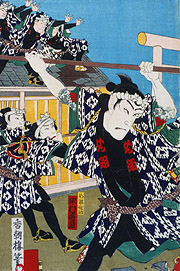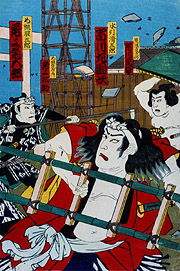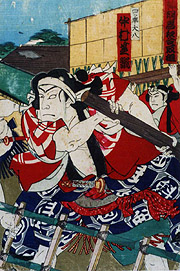| MEGUMI NO KENKA |
| Play title | Kami no Megumi Wag˘ no Torikumi |
| Common title | Megumi no Kenka |
| Author | Takeshiba Kisui |
| History |
Takeshiba Kisui's drama "Kami no Megumi Wag˘ no Torikumi" was premiere in March 1890 at the Kiriza [more details]. Takeshiba Kisui received the help of both Kawatake Mokuami and Kawatake Shinshichi III for the writing of some acts. The core of this drama was a real event, a spectacular brawl between a group of sum˘tori and a group of tobi. This big fight occured in the 2nd lunar month of 1805 near the Shiba Shinmei Shrine. |
| Structure |
The original drama was made up of 4 acts divided into 13 scenes. The current version is made up of 4 acts divided into 9 scenes. |
| Key words |
Edokko Kenka Megumi Megumi no Kenka Rant˘ Rant˘ Jiken Sewamono Shiba Daijingű Shiba Shinmeigű Sum˘ Sum˘mono Sum˘tori Tachimawari Tobi Tobigashira Yotsuguruma Daihachi |
| Summary |
Act I, scene 1 : at the Shimazaki-r˘ in Shinagawa The popular sum˘tori Yotsuguruma Daihachi has been invited to a party by one of his patrons at the geisha restaurant Shimazaki-r˘ in Shinagawa. The party becomes rowdy and one of the drunken sum˘tori loses his balance and falls against the sliding paper door partition, which falls into the adjoining corridor. It strikes the tobi Shibai-ch˘ [1] Fujimatsu, a member of the Megumi (the "Me" group, one of the 48 firefighting brigade in Edo) and one of the guests in the next room party. Quick to fight as all tobi traditionally are, Fujimatsu dashes into the room to complain. The swaggering sum˘tori refuse to apologize and their insulting arrogance increases Fujimatsu's anger. A big fight is about to start when the tobigashira Tatsugor˘, the boss of the Megumi, appears. Tatsugor˘ tries to diplomatically mediate between the sum˘tori and the tobi groups but they keep on flinging insults at each other. Unwilling to cause any further trouble to the Shimazaki-r˘, Tatsugor˘ orders his men to withdraw. They grumble but comply with his order. However, Tatsugor˘ himself has become so incensed at the insulting attitude of the sum˘tori and their patrons. He silently vows revenge. Act I, scene 2: at Yatsuyama later that night Late that same night, just before dawn, Tatsugor˘ is stealthily waiting for Yotsuguruma at Yatsuyama, a place not far from Shinagawa. When Yotsuguruma comes by on his way home, Tatsugor˘ dashes out to kick out the lantern of Yotsuguruma and fights him in the dark but the sum˘tori is stronger than the tobigashira. The fight is interrupted by the arrival of a palanquin carrying Kitadashi Kisabur˘, an influential local boss. Tatsugor˘ slips away but accidentally drops his tobacco pouch which is picked up by Kisabur˘. Act II, Scene 1: before the Playhouse in the Shinmei Shrine Precincts It is spring and a popular Kabuki troupe is performing at a small playhouse in the precincts of the Shiba Shinmei Shrine. The popular Megumi tobi led by Tatsugor˘ are responsible for keeping the peace in this area. Tatsugor˘'s wife Onaka, who happens to pass by with her small son Matahachi, notices the arrogant attitude of the tobi. She hopes that it will not drive them to start a brawl. After resting a while, she goes home with the boy. A moment later a commotion is heard from the playhouse and a couple of tobi throw out a drunkard who had proved himself a nuisance. But now some sum˘tori intervene on the side of the drunkard. A fight between the tobi and the sum˘tori quickly ensues. Tatsugor˘, who happens to pass by, pushes his way toward the fight to admonish his men, but when he finds that their adversaries are the sum˘tori Yotsuguruma Daihachi and Kuryűzan Namiemon, he acts belligerently toward them too. A big brawl is about to ensue, but Edoza Kitar˘, the playhouse proprietor, comes running out to ask them to withdraw in order to let the audience enjoy the play. Once again, Tatsugor˘ is forced to curb his anger and put off the fight until another day. Act III, scene 1: at Kitadashi Kisabur˘'s home [2] The situation between the sum˘tori and the tobi has reached the point of no return. A big fight is inevitable and Tatsugor˘ himself has resolved to fight to death. He goes to meet the influential local boss Kitadashi Kisabur˘ to falsely say that he is going on a pilgrimage. He asks him to take care of his family if something should happen to him on the road. Kisabur˘, who had witnessed Tatsugor˘'s unsuccessful attack on Yotsuguruma at Yatsuyama, guesses Tatsugor˘'s real intent and tries to talk Tatsugor˘ out of the folly of carrying out the fight. Act III, scene 2: at Tatsugor˘'s home in Hamamatsu-ch˘ In the meantime Tatsugor˘'s men are busily preparing for the fight at Tatsugor˘'s home in the district of Hamamatsu-ch˘. They are polishing their firefighting tool, which will be their weapons against their enemies. Tatsugor˘ returns home. He is quite unlike his usual self and seems to have drunk too much. He pretends to have forgotten all about the imminent fight and says that he needs to take a nap. Tatsugor˘'s wife Onaka can't understand the sudden strange change in Tatsugor˘'s attitude and she accuses him of passivity and cowardice in trying to avoid the fight and refusing to protect the honor of his men. When Tatsugor˘ continues to bluff, Onaka loses patience and angrily says she won't be the wife of a coward. Tatsugor˘ angrily writes out a letter of separation. The truth is that this is just the way he wants it. In spite of all, he is determined to go ahead but he wants to keep his wife and child free of any trouble that may result from his future actions. The only way is therefore divorcing Onaka. He asks for a cup of water and offers it to his wife and son. This is the traditional farewell. But now the drums announcing the end of the day's sum˘ matches can be heard. This is the signal waited for. Tatsugor˘'s attitude entirely changes. His strategy was to keep his men from jumping the gun and starting a fight before the sum˘ arena is clear of any fan. Now that the matches are over, it is time to go on the warpath. Onaka sees her familiar Tatsugor˘ again and proudly helps him in his preparations. Then she tears the divorce note to strips. Onaka and Matahachi see Tatsugor˘ off at the entrance. Tatsugor˘ realizes he may not see them again. Act IV, from scene 1 to scene 4 The Megumi tobi are assembled on the street near the Shiba Shinmei Shrine. Tatsugor˘ comes running up to join them. They go through the ritual of exchanging farewell cups of water in an act symbolic of their determination to fight to the death. In the meantime the sum˘tori are going through similar preparations on the street before the sumo house. They've heard of the tobi's plan to attack them there that day and they are all ready. The tobi Megumi group marches to the sight and the tremendous brawl starts. The acrobatic and dynamic tobi against the heavy and powerful sum˘tori. The quick-moving tobi against the slow-moving sum˘tori. Kisabur˘ comes hurrying to the scene and orders them to halt the fight, flaunting his coat as sign of his authority. The tobi pay him no heed. Finally the courageous and determined Kisabur˘ steps into the middle of the fight and says that they may continue to fight only over his dead body. He shows two haori, one with the mon of the tobi and the other with the mon of the sum˘tori, claiming that he can speak for both sides. The fighters, in deference to Kisabur˘'s courage and strength of will, agree to a truce. The fight is over. |
| Notes |
[1] Shibai-ch˘ is an old Edo district name. It corresponds to the current 5th and 6th districts of Shinbashi in T˘ky˘. |
 |
 |
 |
|
The actors Nakamura Jusabur˘ III, Onoe Kikugor˘ V, Onoe Matsusuke IV, Ichikawa Sadanji I, Ichikawa Arajir˘ I and Nakamura Shikan IV playing the roles of Yasuke, Tatsugor˘, Kameemon, Seigor˘, Aranami Kamenosuke and Yotsuguruma Daihachi in the drama "Kami no Megumi Wag˘ no Torikumi", which was staged in March 1890 at the Kiriza (print made by K˘ch˘r˘ H˘sai) |
||
|
|
| Contact | Main | Top | Updates | Actors | Plays | Playwrights | Programs | Links | FAQ | Glossary | Chronology | Illustrations | Prints | Characters | Derivatives | Theaters | Coming soon | News |